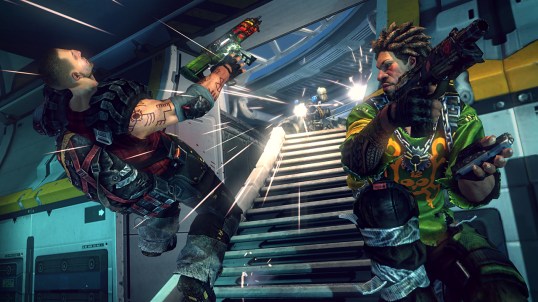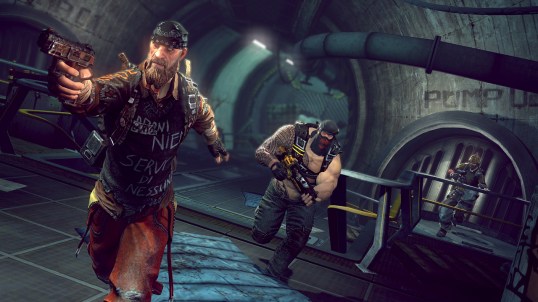As 2010 winds down to a close, this game critic’s finding himself for all FPS’ed out. True, the genre gave us the year’s biggest-selling games in Halo: Reach and Call of Duty: Black Ops. But, it’d be hard to argue that either game gives players an entirely new experience. As I wrote earlier, Brink seems poised to do that in a few ways. Splash Damage–the U.K.-based team making the game–hails from the world of competitive gaming and modding. I poke with various team members about their backgrounds and what’s going in to making one of 2011’s most intriguing games.
How did Splash Damage form as a studio?
Paul Wedgwood: We started out as Splash Damage back in the summer of 2001. Prior to that for a couple of years, a few of us here had worked together as a mod team using id Software as technology. We knew we loved multiplayer games, which was a super -niche thing back then. But we really had this strong belief that social interaction was the future of interactive entertainment. When our first big game Wolfenstein: Enemy Territory came out, it did really well.
Then, we started work on Enemy Territory: Quake Wars, which ended up being a pretty long production, about four years. But that was at a pace that id Software liked to work at. They liked to have smaller teams working on things for a long period of time and really iterate on ideas and polish elements of the game. At one point we cut 12 maps and started again about 18 months into development. It was a different approach to development but it taught us a kind of preparedness to kind of cut things that didn’t work and that led up to the end of 2007. We released that game and it did really well, too. But at this time it was in a declining PC market. Even though that was also a critical success, it came out the same week as Halo 3, Call of Duty: Modern Warfare on the console, Guitar Hero, the week after that. So we could see that if we wanted to continue doing what we did–which was core multiplayer experiences–we would have to make this transition to console development as well. It was the only thing we would be able to do. But, if we wanted to compete in that space, we knew we had create something that was completely new. (More on Techland: On the Brink: Hands-On with 2011’s Experimental Shooter)
So, what were the core ideas of that something new?
Wedgwood: Strangers should be able to play online and coordinate together and have fun and have it not be a game that makes you feel like you’ve been abused when you finish. If you’re talking to others using VOIP, you could be hearing racist insults, people telling you your girlfriend weighs 400 pounds or telling you how much suck five times in a row.
That isn’t what our game is about. Brink is about that kind of buzz, that satisfaction that comes from co-ordinated team play. How do you bring that to the newbie masses? Answering that question is kind of the goal of Brink. And that’s what happened. It was almost magical.
What has been the challenge in trying to create a single-player campaign and incentivize players to work cooperatively?
Richard Hamm, Creative Director: Well that’s probably the core central challenge from a design point of view of the entire game. Because we do want Brink to be almost be sort of a gateway drug. To get offline players interested in online play. We really just have to look at what kind of barriers to people face right now when they try to go online. Going into levels and playing against players who know the map like the back of their hand is a real problem. And so you’re really at a disadvantage. So what do we do? We integrate a system where you can, at a glance, look at this objective wheel, see everything that you can possibly do in a given mission, choose one, and then there are systems within the game that will help you find your way there no matter what.
Do you think that the multiplayer culture has become so inbred that it’s not newbie-friendly anymore?
Wedgwood: It never was newbie-friendly. If anything, it was exactly the same thing. There’s no difference between the elitist online shooter culture in late ‘97 when I was playing Quake 1 and the one that exists now in Halo. (More on Techland: Game System of the Future?: First Impressions of the OnLive MicroConsole)
Hamm: Yeah. You’d run into the same people 10 years ago. Their logic says: “I earned my stripes. I went through hell. They beat the crap out of me and I’m going to do it to you now.” It’s just as bad now.
How does Brink try to change that?
Wedgwood: Richard’s helped a lot in that regard. With his help, we’ve come upon mission system that’s entirely dynamic. The idea behind it is really straightforward. The game knows what combat role you’re playing, where you are on the battlefield, the status of all of the objectives and what your teammates are doing.
Hamm: It knows what the enemy is doing, too. And with all of that, the game suggests
the best thing you can do right now to help your team.
Wedgwood: Repairing things, planting land mines, deploying turrets, giving people health, reviving them on the battlefield, hacking open side doors, capturing command posts… All these peripheral things that help improve the progress of my team or impede the progress of the enemy team.
Hamm: And any activity, any experience you have in life is improved if you share it with someone else. Going to the movies is nice even if it’s a little weird and lonely, but you can still enjoy the movie. Going with a friend, going with some associates you hardly even know, instantly improves that quality.
Going for a lovely walk along the river is nice. Doing it while you hold your girlfriend’s hand is beautiful. Games are the same. You can have a fantastic time. Hunker down in your dark cave playing a really beautifully scripted single-player experience and having all these wonderful action moments. But if you can have a way to share that with somebody else, it’s elevated into something that’s really meaningful. And we think that once players have had those experiences and shared them with other people, it’s very, very hard to go back.
So we talked a little bit about the mechanics a little bit. Let’s talk about the story and how that kind of came about. There’s a huge back story about the Ark. So can you get into that a little bit?
 Hamm: Brink is set on the Ark, which is this artificial city floating out at sea. It was kind of a prototype for mankind’s perfect green future. Sustainable living, renewable resources, and it was awesome. It was literally the eighth wonder of the world. I mean, everything worked. And unfortunately, it came a little too late. The global sea levels rose, hundreds of millions of people were displaced all over the world, and a lot of them as refugees came to the Ark looking for refuge. One way of looking at it would be that the biggest mistake the founders of the Ark ever made was opening their doors and letting all these people in.
Hamm: Brink is set on the Ark, which is this artificial city floating out at sea. It was kind of a prototype for mankind’s perfect green future. Sustainable living, renewable resources, and it was awesome. It was literally the eighth wonder of the world. I mean, everything worked. And unfortunately, it came a little too late. The global sea levels rose, hundreds of millions of people were displaced all over the world, and a lot of them as refugees came to the Ark looking for refuge. One way of looking at it would be that the biggest mistake the founders of the Ark ever made was opening their doors and letting all these people in.
Evan: That’s a very cynical point of view.
Hamm: We cut to about 30 years after the big flood. After three decades of having to house these 50,000 people in a city that’s supposed to house 5,000, the founders were kind of, “Well, did we do the right thing?” Yes we did but, jeez, look at the trouble we’ve made for ourselves. We’re out of resources. We’re out of room. The natives are getting restless. They don’t seem to appreciate what we’ve done for them, what we sacrificed for them. And now they’re threatening to tear our entire society apart. We have no choice.
We have to defend our way of life. We have to keep this place afloat. That’s the attitude you have in the storyline if you choose to play on the side of security. I mean, you are The Thin Blue Line. You are all that’s keeping the place running. Sometimes you might have to stomp heads, but it’s in the greater good. And you always know you’re justified in your actions because if you don’t keep the place going, it will all fall apart.
What about the Resistance?
Hamm: On the flip side, you’ve got all these refugees who are kind of mockingly called “the guests.” Even thought they’ve been there 30 years, they’re still called guests. And that kind of says a lot right there. They are at the end of their rope. They’ve had enough. (More on Techland: Rumor: Remake of the First “Halo” Game Coming Next Year?)
They are living in extreme poverty, five families at a time, crammed into these little storage units. Unclean water. Lack of food. And working, slaving, to keep the whole place running. They’re the ones, if anything breaks down, who fix it. They got the know-how. Without them, the whole place is nothing. And meanwhile, on the other side of the tracks, you got all those founders, who are living in luxury in their glamorous high-rise apartments and all that. Why don’t they share? Why don’t they give back? And they are to their breaking point.
And so they’ve decided, it’s time to take for themselves. So from their perspective, they are completely justified. From the Security perspective, they were completely justified because if you were to spend time with them and they’d say “Look, we have given up a lot. We are living in extreme circumstances too.”
All in all, it sounds like an incredibly grim turn of events. A real “we have met the enemy and he is us” scenario…
Hamm: The answers to all of these guys’ problems would be to put down their guns. Spend a couple minutes to actually look at it from the other side of the world, and see that, they should work together towards their goals. But as is so often the case in the history of mankind, it’s so much easier to fallback into those old tribal patterns where it’s all about me versus you.
That’s how we evolved as a species. That’s how we succeeded. That’s how we got to the top of the food chain where we are now. We are kind of to the point where it’s time for us to socially evolve beyond that. But Brink is all about a situation where they need to do it and they don’t. But that’s OK, because it makes for a lot of fun shooting.
More on Techland:
Microsoft: We Might Make Halo Movie Ourselves




